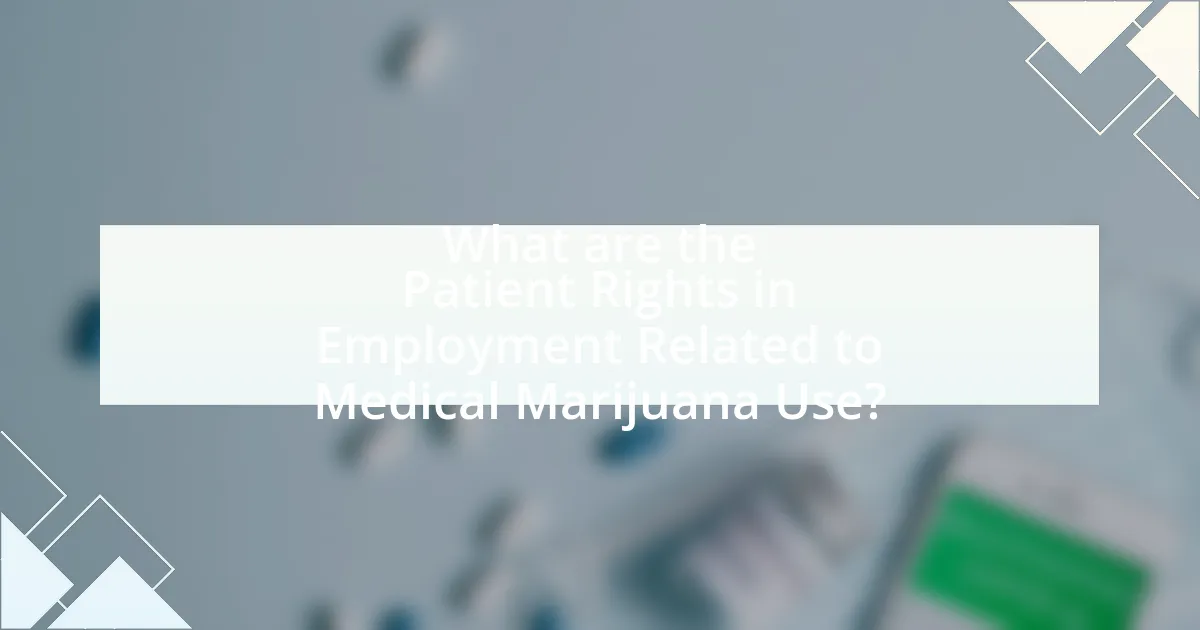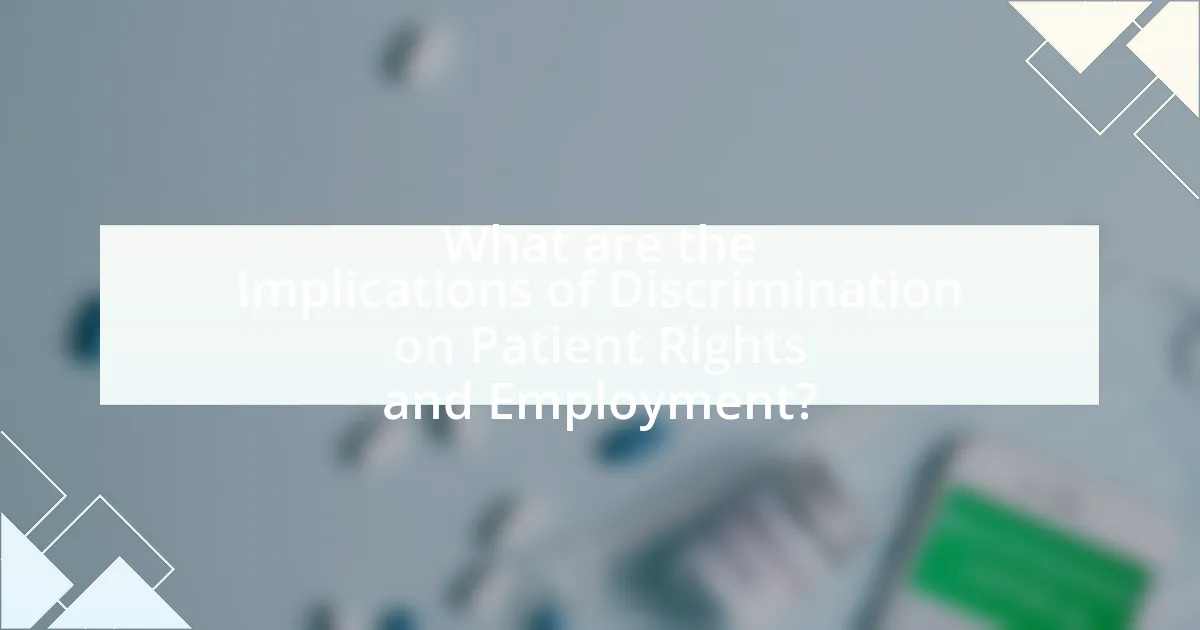The article focuses on addressing discrimination against medical marijuana patients in employment settings, highlighting the legal protections available in various states. It examines how discrimination manifests through biased hiring practices, workplace policies, and social stigma, impacting patients’ rights and mental health. The article also discusses the role of state laws in safeguarding these rights, the importance of addressing discrimination for public health and social equity, and the potential consequences of ignoring such issues. Additionally, it outlines the resources available for patients facing discrimination and the legal avenues they can pursue to assert their rights.

What is Addressing Discrimination in Employment and Medical Marijuana Use?
Addressing discrimination in employment related to medical marijuana use involves ensuring that individuals who use medical marijuana for legitimate health reasons are not unfairly treated or denied employment opportunities. Various states have enacted laws that protect employees from discrimination based on their medical marijuana use, recognizing it as a valid medical treatment. For instance, in states like New Jersey and Pennsylvania, laws explicitly prohibit employers from discriminating against employees for their status as medical marijuana patients. These legal protections aim to create a fair workplace environment where employees can utilize prescribed medical treatments without fear of losing their jobs or facing punitive actions.
How does discrimination manifest in employment for medical marijuana patients?
Discrimination against medical marijuana patients in employment manifests primarily through biased hiring practices, workplace policies, and termination decisions. Employers may refuse to hire individuals who disclose their medical marijuana use, despite legal protections in some jurisdictions, leading to a lack of equal opportunity. Additionally, workplace drug testing policies often do not differentiate between medical and recreational use, resulting in unjust penalties for patients who are legally permitted to use marijuana for medical purposes. Studies indicate that approximately 60% of employers conduct drug tests, which can disproportionately affect medical marijuana patients, leading to job loss or denial of employment based on their legal medical use.
What are the common forms of discrimination faced by these patients?
Patients using medical marijuana commonly face discrimination in employment, healthcare access, and social stigma. Employment discrimination manifests as job termination or denial of employment opportunities due to a patient’s medical marijuana use, despite legal protections in some jurisdictions. Healthcare access discrimination occurs when medical professionals refuse to treat patients or provide inadequate care based on their marijuana use. Social stigma involves negative perceptions and attitudes from the public, which can lead to isolation and mental health challenges for these patients. Studies indicate that individuals using medical marijuana often report feeling marginalized and face barriers that hinder their quality of life.
How do state laws impact discrimination in employment related to medical marijuana?
State laws significantly influence discrimination in employment concerning medical marijuana by establishing protections for employees who use medical cannabis. In states where medical marijuana is legalized, laws often prohibit employers from discriminating against employees based on their status as medical marijuana patients. For instance, in states like California and New York, legislation explicitly protects employees from being fired or discriminated against for using medical marijuana outside of work hours, provided they comply with the law. This legal framework aims to ensure that individuals who require medical marijuana for legitimate health reasons are not unfairly treated in the workplace, thereby reinforcing their rights as patients.
Why is it important to address discrimination against medical marijuana patients?
Addressing discrimination against medical marijuana patients is crucial to ensure their rights and access to necessary treatment. Discrimination can lead to negative health outcomes, as patients may avoid using medical marijuana due to fear of job loss or social stigma, which undermines their health and well-being. Studies indicate that patients who face discrimination are less likely to adhere to their treatment plans, resulting in poorer health outcomes. Furthermore, legal protections are essential to foster an inclusive environment where patients can utilize their prescribed treatments without fear of repercussions, thereby promoting public health and social equity.
What are the potential consequences of ignoring discrimination in this context?
Ignoring discrimination in the context of patient rights in employment and medical marijuana use can lead to significant legal and social consequences. Legally, employers may face lawsuits for violating anti-discrimination laws, such as the Americans with Disabilities Act, which protects individuals using medical marijuana for legitimate health conditions. Socially, neglecting discrimination can foster a hostile work environment, resulting in decreased employee morale and productivity, as well as potential public backlash against the organization. Studies indicate that workplaces that fail to address discrimination experience higher turnover rates and lower employee satisfaction, which can ultimately harm the organization’s reputation and financial performance.
How does addressing discrimination benefit workplaces and society?
Addressing discrimination benefits workplaces and society by fostering inclusivity and enhancing productivity. Inclusive workplaces attract diverse talent, which leads to improved problem-solving and innovation, as diverse teams are known to generate more creative solutions. According to a McKinsey report, companies in the top quartile for gender and racial diversity are 35% more likely to have financial returns above their respective national industry medians. Furthermore, addressing discrimination reduces employee turnover and absenteeism, which can save organizations significant costs associated with hiring and training new staff. In society, combating discrimination promotes social cohesion and equality, leading to a more stable and harmonious community. Research from the American Psychological Association indicates that societies with lower levels of discrimination experience higher levels of overall well-being and economic growth.

What are the Patient Rights in Employment Related to Medical Marijuana Use?
Patients using medical marijuana have specific rights in employment, primarily protected under state laws that recognize medical marijuana use. These rights often include protection against discrimination based on medical marijuana use, the right to reasonable accommodation for medical needs, and the right to privacy regarding medical conditions. For instance, in states like California, the Fair Employment and Housing Act prohibits employers from discriminating against employees for their status as medical marijuana patients. Additionally, some states require employers to engage in an interactive process to accommodate employees’ medical needs related to marijuana use, provided it does not pose a safety risk.
What legal protections exist for medical marijuana patients in the workplace?
Medical marijuana patients have varying legal protections in the workplace depending on state laws. In states where medical marijuana is legal, laws often prohibit discrimination against employees for their status as medical marijuana patients. For instance, some states require employers to accommodate medical marijuana use, similar to how they would accommodate other medical conditions. However, federal law still classifies marijuana as a Schedule I substance, which complicates protections. In states like California and Colorado, courts have upheld that employees cannot be terminated solely for their medical marijuana use if it does not impair job performance. These legal frameworks aim to balance patient rights with employer interests, but the specifics can differ significantly by jurisdiction.
How do federal and state laws differ in protecting these rights?
Federal and state laws differ significantly in protecting patient rights related to employment and medical marijuana use. Federal law, specifically the Controlled Substances Act, classifies marijuana as a Schedule I substance, which means it is illegal at the federal level, leading to limited protections for employees who use medical marijuana. In contrast, many states have enacted laws that protect employees from discrimination based on their medical marijuana use, allowing for legal use under specific conditions. For example, states like California and Colorado have laws that explicitly protect employees from being fired for using medical marijuana outside of work hours, reflecting a more progressive stance on patient rights compared to federal regulations. This discrepancy creates a complex legal landscape where state protections can offer more rights than federal law, leading to potential conflicts in enforcement and compliance.
What role do employers play in accommodating medical marijuana use?
Employers play a crucial role in accommodating medical marijuana use by establishing policies that comply with state laws while balancing workplace safety and employee rights. They must evaluate requests for accommodation on a case-by-case basis, considering factors such as the employee’s medical condition, job responsibilities, and the potential impact on workplace safety. For instance, in states where medical marijuana is legal, employers are often required to engage in an interactive process with employees to determine reasonable accommodations, which may include adjusting work schedules or modifying job duties. This approach is supported by legal precedents that emphasize the need for employers to provide reasonable accommodations under disability laws, ensuring that employees can use medical marijuana without facing discrimination or adverse employment actions.
How can patients assert their rights in the workplace?
Patients can assert their rights in the workplace by understanding and utilizing relevant laws that protect them from discrimination, particularly regarding medical conditions and the use of medical marijuana. The Americans with Disabilities Act (ADA) prohibits discrimination against individuals with disabilities, which can include patients using medical marijuana for qualifying conditions. Additionally, patients should communicate openly with their employers about their medical needs and rights, ensuring they provide necessary documentation when required. Legal protections vary by state, so patients must also familiarize themselves with local laws that may offer additional safeguards. By being informed and proactive, patients can effectively advocate for their rights in the workplace.
What steps should patients take if they experience discrimination?
Patients who experience discrimination should first document the incident, noting the date, time, location, and details of what occurred. This documentation serves as a crucial record that can support their claims. Next, patients should report the discrimination to the appropriate authority within the healthcare facility, such as a patient advocate or the human resources department, as many institutions have policies in place to address such complaints. Additionally, patients may consider filing a formal complaint with external organizations, such as the Equal Employment Opportunity Commission (EEOC) or the Department of Health and Human Services (HHS), which handle discrimination cases. Seeking legal advice from an attorney specializing in discrimination law can also provide guidance on potential legal actions. These steps are essential for ensuring that patients’ rights are upheld and that discriminatory practices are addressed effectively.
How can legal resources assist patients in asserting their rights?
Legal resources assist patients in asserting their rights by providing access to legal information, representation, and advocacy specific to healthcare and employment issues. These resources can help patients understand their rights under laws such as the Americans with Disabilities Act and state medical marijuana laws, which protect against discrimination in employment and healthcare settings. For instance, legal aid organizations often offer free consultations and can represent patients in disputes related to wrongful termination or denial of medical services due to their status as medical marijuana users. This support is crucial in navigating complex legal frameworks and ensuring that patients can effectively advocate for their rights in the face of discrimination.

What are the Implications of Discrimination on Patient Rights and Employment?
Discrimination significantly undermines patient rights and employment by creating barriers to equitable access to healthcare and fair job opportunities. In healthcare, discrimination can lead to inadequate treatment, denial of services, and violation of patient confidentiality, particularly for marginalized groups. For instance, studies show that racial and ethnic minorities often receive lower quality care, which can exacerbate health disparities. In the employment sector, discrimination can result in wrongful termination, unequal pay, and limited career advancement for affected individuals. According to the U.S. Equal Employment Opportunity Commission, discrimination complaints have consistently highlighted issues related to race, gender, and disability, indicating systemic biases that impact job security and workplace equality. Thus, the implications of discrimination are profound, affecting both the health outcomes of patients and the professional lives of employees.
How does discrimination affect the mental health of medical marijuana patients?
Discrimination negatively impacts the mental health of medical marijuana patients by increasing stress, anxiety, and feelings of isolation. Studies indicate that patients who face stigma or discrimination related to their medical marijuana use often experience heightened psychological distress, which can exacerbate existing mental health conditions. For instance, a survey published in the Journal of Psychoactive Drugs found that 62% of medical marijuana patients reported experiencing discrimination, leading to increased anxiety and depression levels. This correlation highlights the detrimental effects of societal stigma on the mental well-being of individuals utilizing medical marijuana for therapeutic purposes.
What are the long-term effects of workplace discrimination on patients?
Workplace discrimination has significant long-term effects on patients, including chronic stress, mental health issues, and reduced access to healthcare. Chronic stress resulting from discrimination can lead to conditions such as anxiety and depression, which have been documented in studies showing that marginalized groups experience higher rates of these mental health disorders. Additionally, patients facing discrimination may avoid seeking medical care due to fear of further discrimination, leading to untreated health issues and poorer health outcomes over time. Research indicates that individuals who experience workplace discrimination are more likely to report negative health impacts, reinforcing the need for addressing these discriminatory practices to improve patient well-being.
How can employers mitigate the negative impacts of discrimination?
Employers can mitigate the negative impacts of discrimination by implementing comprehensive diversity and inclusion training programs. These programs educate employees about unconscious biases and promote an inclusive workplace culture, which has been shown to reduce discriminatory behaviors. For instance, a study by McKinsey & Company found that companies with diverse workforces are 35% more likely to outperform their industry medians in terms of financial returns. Additionally, establishing clear anti-discrimination policies and procedures for reporting incidents can create a safer environment for employees, further decreasing the likelihood of discrimination.
What best practices can employers adopt to prevent discrimination?
Employers can adopt several best practices to prevent discrimination, including implementing comprehensive anti-discrimination policies, conducting regular training sessions, and establishing clear reporting mechanisms. Comprehensive anti-discrimination policies should explicitly outline prohibited behaviors and the consequences for violations, ensuring all employees understand their rights and responsibilities. Regular training sessions on diversity, equity, and inclusion can raise awareness and educate employees about unconscious biases and discriminatory practices, fostering a more inclusive workplace culture. Additionally, establishing clear reporting mechanisms allows employees to report discrimination without fear of retaliation, promoting accountability and transparency within the organization. These practices are supported by research indicating that organizations with strong anti-discrimination policies and training programs experience lower rates of discrimination claims and higher employee satisfaction.
How can training and education help create a more inclusive workplace?
Training and education can create a more inclusive workplace by equipping employees with the knowledge and skills to understand and respect diverse perspectives. This approach fosters an environment where all individuals feel valued and included, which is essential for addressing discrimination. Research indicates that organizations implementing diversity training see a 20% increase in employee engagement and a 30% reduction in turnover rates, demonstrating the effectiveness of such initiatives in promoting inclusivity. Furthermore, education on patient rights, particularly regarding medical marijuana use, can help employees navigate legal complexities and reduce stigma, thereby enhancing workplace harmony and compliance with regulations.
What policies should be implemented to support medical marijuana patients?
Policies that should be implemented to support medical marijuana patients include legal protections against employment discrimination and access to affordable healthcare. Legal protections would ensure that patients are not terminated or discriminated against in the workplace solely for their medical marijuana use, as evidenced by states like California, which have enacted laws to safeguard patient rights. Additionally, access to affordable healthcare is crucial; studies show that patients with medical marijuana prescriptions often face high out-of-pocket costs, which can be alleviated through insurance coverage for medical cannabis. Implementing these policies would create a more equitable environment for medical marijuana patients, ensuring their rights are upheld in both employment and healthcare contexts.
What resources are available for patients facing discrimination?
Patients facing discrimination can access various resources, including legal aid organizations, advocacy groups, and government agencies. Legal aid organizations provide free or low-cost legal assistance to individuals experiencing discrimination, helping them understand their rights and navigate the legal system. Advocacy groups, such as the American Civil Liberties Union (ACLU) and the National Organization for the Reform of Marijuana Laws (NORML), offer support, resources, and information on patient rights related to discrimination, particularly in the context of medical marijuana use. Additionally, government agencies like the Equal Employment Opportunity Commission (EEOC) enforce federal laws prohibiting employment discrimination and can investigate complaints. These resources collectively empower patients to address and combat discrimination effectively.
How can advocacy groups assist medical marijuana patients in employment issues?
Advocacy groups can assist medical marijuana patients in employment issues by providing legal support, education, and resources to navigate workplace discrimination. These organizations often offer legal representation or referrals to attorneys specializing in employment law, helping patients understand their rights under state laws that protect medical marijuana use. For instance, in states like California, laws prohibit discrimination against employees for medical marijuana use, and advocacy groups can help patients assert these rights. Additionally, advocacy groups conduct awareness campaigns to educate employers about the legal protections for medical marijuana patients, fostering a more inclusive work environment.
What legal avenues can patients explore if their rights are violated?
Patients can explore several legal avenues if their rights are violated, including filing complaints with regulatory agencies, pursuing civil lawsuits, and seeking mediation or arbitration. Regulatory agencies, such as the Department of Health and Human Services, allow patients to report violations of their rights under laws like the Health Insurance Portability and Accountability Act (HIPAA). Civil lawsuits can be filed against healthcare providers or employers for discrimination or wrongful denial of medical services, supported by statutes like the Americans with Disabilities Act (ADA). Mediation or arbitration can provide alternative dispute resolution options, often outlined in patient agreements or employment contracts. These avenues are essential for protecting patient rights and ensuring accountability in healthcare and employment settings.

Leave a Reply